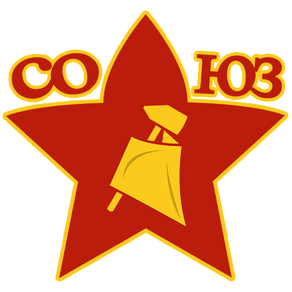
Neo Bolshevik ensignia.
Neo-Bolsheviksm is a political movement born from western Russia after the failure of the original Bolshevik Revolution in 1914 from those who remained in Russia following the bloody end of the Revolution. Neo-Bolshevekism is of the original Leninist teachings, held together by salvaged and re-pieced speech notes and essays written by the former Revolutionary. For a period, Neo-Bolshevekism remained dormant, only really present as a counter to the Tzar's far-right policies and those who contended the Tzar's corruption.
Following the success of the Chinese Revolution and China's rise to a stable power the Neo-Bolsheviks held China as being a succesfull Communist nation. Though they view much of the Houist doctrine as being a divergence from the core Leninist principle they attest that the edits are arbitrary and tolerable.
History[]
Neo-Bolsheviks have been the ever-present menace of the Tsardom after their defeat in what is often called by the Tsars as the "Disgraceful Revolt" of 1917. The Neo-Bolsheviks, while estimated to be very few and isolated by fear of being ratted-out to the authorities, are admitted even by the Tsar to have a dangerous amount of clout, if only because they're the perfect excuse for unwarranted arrests and executions of the Tsar's enemies in the form of Neo-Bolshevik witch hunts.
Despite a half-century of brutal repression, the Neo-Bolsheviks have existed in the shadows of the upper echelons of the Tsardom and are likely common among the working class of Russian society. Their numbers increase with every blunder the Tsar commits, and shrink in response to the Tsar's or the local magistrate's efforts to stamp these traitors out.
By location[]
Smolensk[]
The first major Neo Bolshevik uprising occured in Smolensk on November 3, 1967 when local Bolshevik Ilya Zhdavov stormed the local magistrate's office with his band of followers to openly protest the rule of the Czar and encourage national revolution. The uprising came to a sudden end as shortly after forcin their way into the magistrate of Smolensk's office. Likely summoned by the magistrate himself, the local militia rushed to his aid. The militia immediatly rounded up or executing the Bolsheviks, going so far as to slay Ilya Zhadavov in the middle of the Magistrate's office.
Father Dmytro Radek was arrested, and along with several other Neo-Bolsheviks were emprisoned in the Vyakta Internment Center in Kirov, Russia.
Southern Urals[]
On December 8, 1970 Radek and a large number of Neo Bolsheviks inturned at the Vyakta Internment Center in Kirov staged a violent break-out, ultimately resulting in the over-throw of the prison's guards. Though starved, they began the process of arming themselves and preparing for a full-force second revolution against the Czar.
It was here that Radek ultimately became nominated as the de-facto leader of the Neo Bolsheviks. The resulting campaigns resulted in revolts in Smolensk, Belarussia, Novogord, and Saint Petersburg.
Saint Petersburg[]
Over the early course of the Revolution Radek's forces were eventually forced to concentrate themselves around Estonia, Saint Petersburg, and Novogorod effectivly forming their own country. With their other cells going into hiding or being beaten to the saftey of the newfound Western Communes.
Belarus[]
This section is deemed as non-canonical
During the revolution against the splintering Tzarist and "White" forces of Russia, the defected 15th Army moved into the territories of Belarussia, and negotiating with the local authorities established an occupation and later a local government in Belarussia, under the guise of Uladzimir Sergeiyovich Gorbachyov . Ultimately though, the politics of Uladzimir ran afoul of Radek and the main block of the Neo Bolshevik faction in Saint Petersburg and a personal rift between Uladzimir and Radek, as well as a political rift over Chinese relations formed, seperating the two sub-nations. The resulting split giving rise to a sort of Belarussian Neo Bolshevikism.
Propegation of the "Five Years Chaos"[]
Neo-Bolsheviksm plays a propegating role in the Neo Bolesheviksm by claiming the nation the right of the workers and dismissing the Russian Republic and the neighboring states within Russia as being shallow and false. Critical of Ukrainian involvement, the Neo-Bolsheviks kept a tight watch to the south.
Unconfirmed Ukrainian attacks on the Commune's northern neighbor allowing them to take Arkhalengisk. Though future moves are stalled, as per the legalities of the Moscow Pact.
Defections[]
During the explosive rise of Radek in 1971 several Imperial Army generals protested Tzar Peter II's demands to attack the Russian people under Radek and defected to Radek's Neo Bolsheviks. Most prominantly, General Makulov in Yekenterinburg declared his support for Radek, and defected to the cause on the basis Radek and the Neo-Bolsheviks are the people of Russia, and he swore to defend them.
Alternative Forms[]
Utilizing Neo-Bolshevik ideology, Sven Frihet-Kampe assembled a political vision of Scandinavia based on the principles of post-Leninist Bolshevikism. Though namely the conditions of his ideology differ from that of Russian Neobolshevikism in that there is a reliance on national pride among its subscribers, and less that than traditional forms of Communism and an international mission to bring about the proletariat revolution.
Once more, the system styles for itself a state-religion of hero worship, as opposed to the abolition of religion. This point supporting its nationalist basis.